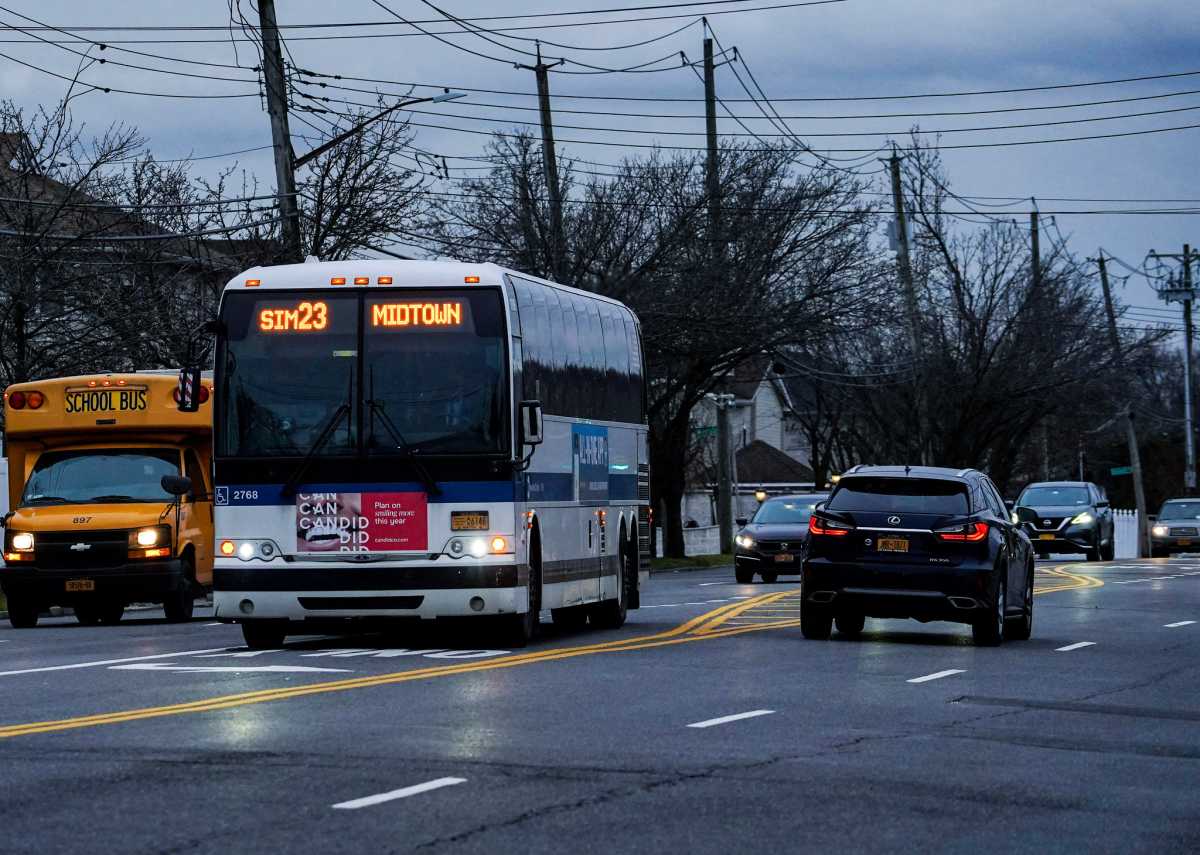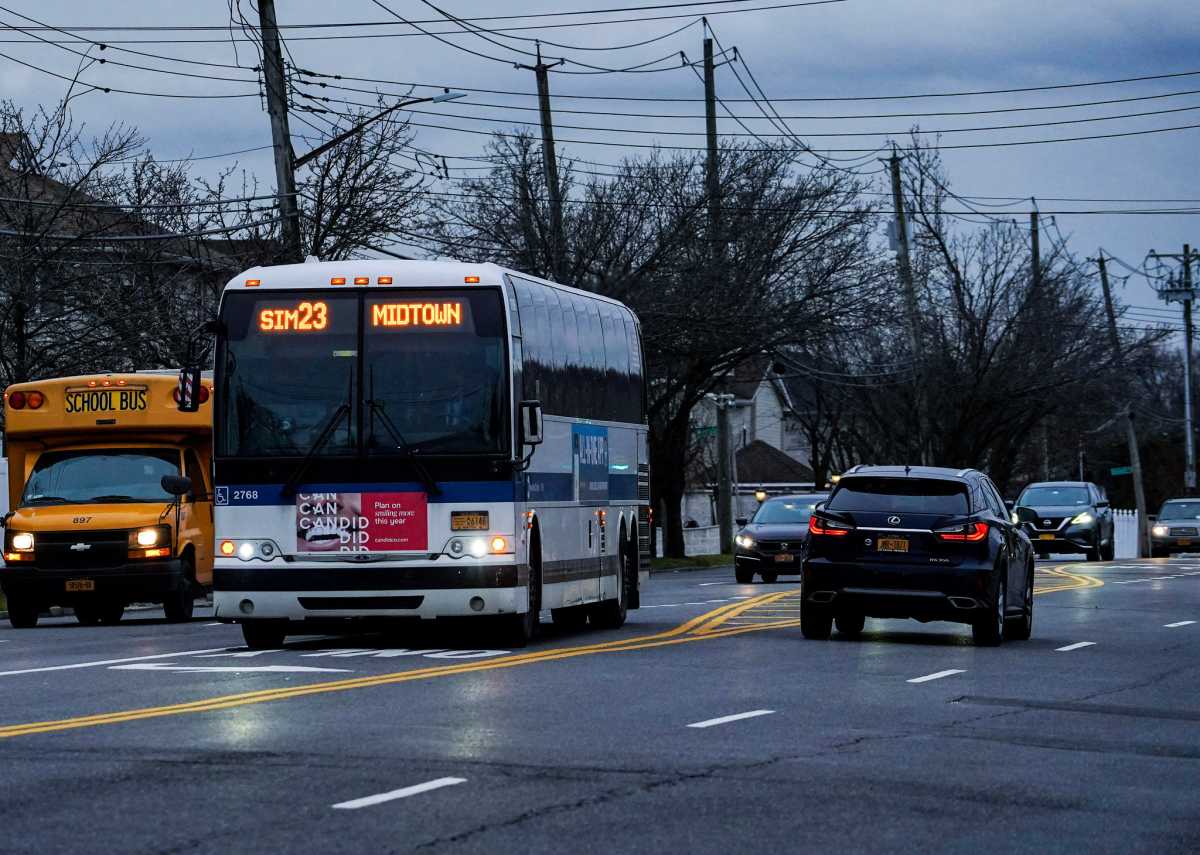
A SIM23 express bus on Hylan Boulevard in Annadale, Staten Island in 2022.
Marc A. Hermann / MTA
Staten Islanders are riding on faster buses this year, thanks in part to congestion pricing, an improved express bus network and other transit enhancements, according to MTA officials on Monday.
Demetrius Crichlow, president of NYC Transit, said during an MTA transit and bus committee meeting on July 28 that bus service on Staten Island has experienced delays 10% less often since the onset of congestion pricing on Jan. 5.
Crichlow touted other benefits for the borough’s buses, including the 2018 network redesign of express bus service that increased speeds by 16%.
Traffic in the congestion relief zone, located south of 61st Street in Manhattan where Staten Island commuters in many locations can grab an express bus home, has decreased, according to the agency. MTA officials said that the baseline historical daily average of vehicles entering the tolling zone is 647,200 in the month of May. However, in May 2025, with congestion pricing, the average daily vehicle entries dropped to 580,227, the agency said.
The Monday bus update follows a meeting on July 17 between MTA representatives and Staten Island Borough President Vito Fossella — a vocal opponent of congestion pricing — that focused on bus service improvements.
“When customers aren’t happy, I personally get calls, I get emails, we get letters,” Crichlow said. “If it’s a priority for them, it’s a priority for me to ensure that we continue to work as a team to provide the service that we need to.”
A call from the Trump administration to Staten Island
In an interview with amNewYork, Fossella said the MTA is committed to improving bus service, zeroing in on express buses, along with a number of “short and long term” solutions.
“Express bus service for thousands of Staten Island commuters is essential,” the beep said. “They deserve the best, and quite recently, they have not gotten the best. There are too many cancellations, too many breakdowns, maintenance issues.”
However, he told amNewYork that while the MTA acknowledged the bus troubles, his office received a call from the federal government offering support to improve Staten Island’s bus service. Federal Transportation Administration Senior Advisor Marc Molinaro pinged the beep last week to tell him President Donald Trump’s administration wants to “be helpful” in resolving Staten Island’s commuting concerns.
“Marc Molinaro, who’s a friend and knows Staten Island well, reached out on behalf of President Trump and the administration wanting to be helpful. We appreciate President Trump and Marc Molinaro for stepping in to try to be helpful,” Fossella said of the administration, which has a legal battle against the MTA for keeping congestion pricing active.
Although Fossella found his conversation with MTA officials to be “forthcoming and candid,” he said he welcomed any help he can get from Molinaro and the feds.
“Whether it’s more buses, capacity, streamlining maintenance operations, however they can be of assistance, he said he would be,” Fossella explained.
What are bus riders experiencing?
Meanwhile, local and express bus riders said they are not feeling the benefits of congestion pricing. Express bus advocate Filippa Grisafi said commuters in the borough are dealing with long commute times, mostly due to cancellations and delays.
“That’s an outright lie. We have hundreds of open trips every week, there are absolutely no fewer delays,” she said. “They mean actual bus time is faster, but what about waiting 30 to 60 minutes for a bus to show up?”
Lynne Windsor, who uses the Staten Island express buses several times a week, said her route to Midtown via the FDR Drive only improved briefly when congestion pricing launched.
“The FDR has more traffic since it is not part of congestion pricing,” she described. “Many exit at the Brooklyn Bridge to avoid the tolls. We still have issues at the underpass to the Hugh L. Carey Tunnel. The bus lanes are still blocked in the city, so no improvement.”
Vittorio Bugatti, an express bus advocate, said since the MTA met with Fossella, cancellations have subsided. Despite the good news, he said he will continue to monitor the service, which is a pivotal connection for Staten Islanders to the rest of the city.
In the meantime, Crichlow said 130 more buses will be added to the Staten Island fleet in 2026. This is in addition to 200 new buses being woven into the fleet since 2018.
The MTA will also update maintenance practices and procedures for Staten Island buses, including the launch of a new Quality Assurance team that will be deployed across the borough to make easy, on-the-spot repairs to buses.
“To the people of Staten Island, you deserve world-class transportation service,” Crichlow said. “And we are committed and excited to deliver that for you.”
